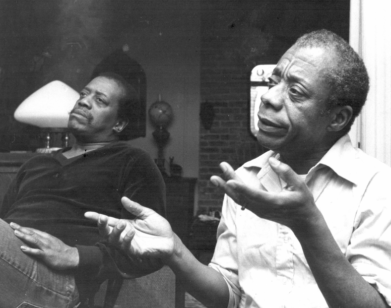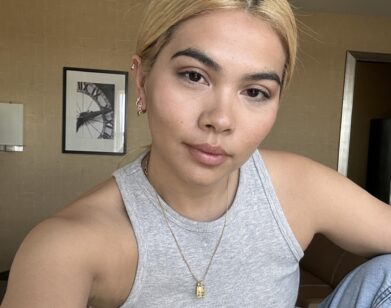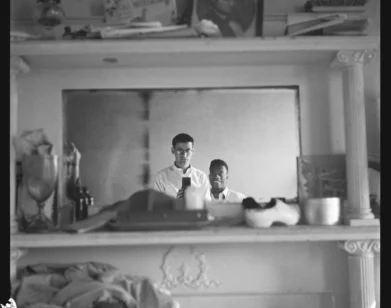LIT
Aria Aber on Age Gaps, Cheap Thrills, and Her Debut Novel Good Girl
When my novel, The Lookback Window, came out, Aria Aber wrote that we were artistic siblings. I waited two years to find out what my fellow Aries meant. Good Girl, Aber’s second book and debut novel, is a trenchant künstlerroman that follows Nila, the daughter of Afghan refugees living with her family in Berlin, who meets Marlowe, an American writer working on a second book, in a Berghain-like club nicknamed “The Bunker.” They do speed and ketamine and molly, they fuck and shower, while exchanging ideas about life and art. But he’s got a girlfriend, and Nila befriends her, learning the pleasures and terror of dating an attractive, manipulative older man. The novel depicts the ways that growing in the throes of familial and societal violence can lead one toward romantic destruction. Ecstasy takes the slap for you, and growing up requires individuating. Nila’s hedonistic detours from the life of a good girl creates a different type of good girl, an escape that demands another. This is her journey.
Aber follows the consequences of pleasure to their natural end, revealing her own stylistic goals in a scene where Nila takes a camera and decides to photograph herself and Marlowe after a night of raving. Does beauty still exist the morning after, once the makeup’s been washed off? From the refugees of Kabul to the ravers of the underground scene, Aber denudes her characters until you are the one finally rubbing at your own face, wondering what will greet you if you tried to capture the picture. Earlier this year, I caught up with the author to find out how she created such an extraordinary book.
———
KYLE DILLON HERTZ: Hey, Aria.
ARIA ABER: Hi, Kyle.
HERTZ: How are you doing?
ABER: I’m doing okay. I just washed my hair, which always feels healing. What about you?
HERTZ: One of the reasons why I wanted to talk to you about Good Girl is that, when my book came out, you talked about us being artistic siblings. Of course, I was curious what that meant. Now having read your book, I really understand why, because it features this main character, Nila, who is coming to terms with herself as an artist and as a person, with the forces of drugs and idiotic, older, potentially predatory men getting involved with her.
ABER: I wanted to write a story that deals with this very typical and often reductively portrayed relationship between a young person and an older person who, as you say, could be seen as predatory. I guess on the surface it is predatory, but there is also so much agency that you think you have at that age. I think there are many more nuances to a relationship that is erotically and mentally exciting at that age because you can learn about your own boundaries. It was inspired by a relationship I had myself at that age, which impacted my life immensely. I was drawn to writing something that explores it, and with enough complications that you can’t really think of it as black and white. When I read your book, I felt such a kinship to the protagonist because of the intensity of his yearning for self-fulfillment. He has to break through so many layers of self-destruction in order to find his voice, which was similar to my own book.
HERTZ: How did you map out Nila’s journey from realizing, “There’s this amazing cool writer who’s teaching me about drugs and techno” to, “Wow, this man might actually be fucking whack”?
ABER: That is a really interesting question, and I think how I ended up portraying it is to create a kind of symmetry between the two. As Nila is finding her own voice as an artist, Marlowe’s arc is kind of falling, right? I really wanted those two to exist in tandem but also in tension with each other. It’s so interesting that you talk about the allure of these older people who seem glamorous and exciting, but are actually very sad figures on the scene who are stuck in that world of hedonism because they have lost the plot and don’t know what to do with their own lives anymore. And also prey on younger people because they yearn for the glimmers of intensity that they can provide them.
HERTZ: I always wonder about those kinds of relationships. For example, I crave knowledge. In these spaces, these men have a lot of expertise. Is that something that you think Nila is attracted to?
ABER: I do think that Nila is attracted to knowledge, and she’s also attracted to a kind of worldliness that Marlowe represents to her because he’s exotic. He is an American writer and an expat. He’s an artistic immigrant, whereas her family are refugees. So his experience of Germany as a foreigner is diametrically opposed to hers. And yet, they share this common denominator of not being native to the place that they find themselves in. Later in the novel, there is this one chapter where these neo-Nazis end up at an after hours with them. She has this realization when the neo-Nazis mock his accent where she suddenly sees him as weak and less glamorous. She becomes aware of his vulnerability as an immigrant, too.
HERTZ: And what do you think attracts him to her?
ABER: I think the glimmer of youth is something that he’s obsessed with, but also he is just generally attracted to younger women. Doreen, the girlfriend that he has at the beginning, is also much younger than him. But I think he also is attracted to her ambition, which she is not completely aware of yet at the beginning of their relationship. He sees that in her and he’s tickling it out of her slightly, right? He becomes this mentor figure. I think by having Nila in his life, he feels more powerful as an artist, even though he is struggling to make a name for himself or maintain the reputation he had earned in his youth.
HERTZ: Those kinds of relationships are so interesting to me for that reason that you mentioned—what do they get from each other? It’s not purely sex. Most people in your book are in this endless loop. It’s not just Marlowe, but you can think of Nila’s parents as being kind of stuck in an endless loop in various ways. In one sense, they’ve left Afghanistan seven years after her other family came to Germany. But what is it like to be a person granted asylum in a different country seven years too late? How do you deal with moments of people being stuck?
ABER: The main thing that I wanted to bring across in this novel when it came to the portrayal of this refugee family is that there are so many different ways of becoming an immigrant in a new country, even if it seems bureaucratically similar. What is privilege? What is shame? What is assimilation? All of these things manifest extremely differently for each of the family members. To think about it in terms of time, a 7-year period, is so fascinating to me because I don’t even think I was conscious of doing that while I was writing. I was just aware that fate is often deterministic, but also dependent on luck and things out of your control. Nila’s parents left later than other members of her family because they were idealistic and wanted to stay in the country and thought there was a future there. The only one who successfully assimilated was Sabrina, the aunt, who actually became an important figure for Nila. So ultimately, it’s quite tragic what allowed one member of the family to thrive, whereas the others were left behind.
HERTZ: There’s these little violences throughout the book. You hear about kids getting slapped by their parents or Nila, the way she’s always afraid that one of her uncles who’s a taxi driver will see her because of the ways that she is “rebelling” against a certain kind of culture. How do you see this violence that she grew up in? Is it the major violence of being a refugee, or is it the little violence of a slap?
ABER: How do I see this violence? I think it’s ubiquitous and it exists in so many different ways in this book because I was really fascinated by violence on a state level, which I discuss through the National Socialist Underground organization. And then the violence in these interpersonal dynamics—familial, romantic, and otherwise. This group of people in her immigrant neighborhood are just so accustomed to physical violence on a daily scale that they don’t even think of it as anything abnormal, right? It’s their way of showing love or showing care because it’s something that the parents have inherited from their parents, which impacts the way she thinks about her relationship with Marlowe. I don’t like pathologizing fictional characters. I love pathology because it can be extremely liberating to receive a diagnosis for something that seems like an aberration or a life sentence for how you interact with people, but when it comes to fictional characters, especially Nila, I don’t see her as traumatized—even though she is, of course, and everyone else around her is as well. I just think that, for this book, it was important to bring that up in order to highlight why Nila remains in the relationship with Marlowe. Maybe someone else with a slightly different kind of upbringing or community would leave him much sooner.
HERTZ: This sounds like such a stupid question, but what do you make of the fact that he gets violent with her?
ABER: I think it’s inevitable in the scope of their relationship. He is kind of investigating what her boundaries are, how far he can push her, what he can make her do and endure in order to be with him. And she goes pretty far. She’s also perhaps seeking a kind of intensity that is physical and she can’t really identify whether or not it’s part of the erotic game. Maybe she’s yearning for a different kind of violence. And she says that later on in the book, when the relationship kind of deteriorates and he hits her outside of the bedroom, that this is not what she agreed to. She thought it was part of an erotic game, but it has become abject and sad. He’s suffering and he lets it out on her because she’s there.
HERTZ: And she goes through with it because, what do you really know in this kind of circumstance? It’s all the cliches—if you’ve been hit, it’s easy to hit. I think that’s something your book posits. Why are all these people, not just of one sect but across the board, just casually hitting other people? And then, why do we just take it and stay? What do you think it says about our culture?
ABER: We need to ask these questions because the normalization of this kind of violence, even if it is cultural, does not mean that it’s okay or should be perpetuated. The cycle needs to be broken, and I really hope it happens within my generation. I would never hit a child. That’s not something that I have ever thought about or wanted to do. But in order for us to break through the cycle of casually accepted violence, we need to talk about these things. I don’t necessarily think the novel has to be this moral form where I say, “This should not happen,” but I do think it’s hinted at in the deterioration of the relationship.
HERTZ: It’s so hard because on the one hand you think, “I would never ever hit a child or my loved one,” but there’s so many people who do.
ABER: There is this tendency to just think of it as black and white, the victim and perpetrator. But I think there are many more categories that each part can fall into, and we have to grant more agency to people if they want it. Maybe there are different iterations of age-gap relationships. There are different iterations of family violence. Some of them can be extremely debilitating and others can be less so. But how do we talk about these things without falling back to cliches and stereotypes?
HERTZ: Speaking of stereotypes, I love how so many of the techno people are real fucking idiots. In our culture right now, we’re experiencing a major church-ification of that space, which is so crazy because anyone who has spent time there has encountered some of the dumbest people that exist.
ABER: I’m really interested in what the techno culture is like here in the US because I’m honestly just familiar with it in Germany. It attracts some of the worst people I’ve ever met, but also some of the brightest and most interesting minds that would exist in academia. I’ve had conversations in clubs that were so illuminating and that I still think about even now. In Berlin, it’s become so normalized because the cost of living is so low, and drugs, especially the cheap kinds like amphetamines and speed, are so readily available. It’s become a kind of parallel society. A lot of them pride themselves on having some counter-cultural or revolutionary aspect at their core, but in reality they’re just orgies of hedonism that have no political value. It’s kind of a paradoxical environment where everyone comes together, and I guess drugs are the ultimate democratizer.
HERTZ: One of the reasons why I am drawn to Nila is I’m an indulgent person. If I’m in love, I’m going to be head over heels. Nila’s kind of like that, too. I think that makes for such a good character, because this type of person is going to make great mistakes on their way to whatever their fate is.
ABER: I realized that in literary fiction, when we encounter a first-person narrator they’re oftentimes incredibly repressed. I wrote kind of the opposite character, someone who has grown up in a repressed household but yearns for excess and intensity and is incredibly impulsive and makes one bad decision after the other. It’s easy to put a character like Nila in completely absurd and indulgent situations. I wanted that kind of protagonist because it makes for a kind of consciousness that would lend itself to this type of drug and club culture. Only a certain type of person is attracted to maintaining so much space there. And I am a very intense and impulsive person myself, so it was easier to write.
HERTZ: What kind of role do you think love plays in the novel for a person like Nila, who craves it?
ABER: She loves everything and everyone around her so much that I think it becomes a burden. Love, of course, is a catalyst for intensity in this novel. But there is also this love for the world and life and her friends and everyone around her that overwhelms her. And I think that is juxtaposed with the hatred she feels for herself. These two forces of love and hatred, both in an extremely intense iteration, exist within her and lead to sometimes self-destructive behavior. But I do think it’s ultimately a love letter to Berlin as a city. It’s also a love letter to the friends around her and to art and to family and to language, because one other type of indulgence I’m allowing myself within this book is to just revel in intense language.
HERTZ: You’re a poet, so how much attention did you pay toward language? I mean this in the greatest possible way, but this is not a poet’s novel.
ABER: That is the greatest compliment to me. I really didn’t want to write a poet’s novel, even though I don’t know what that means exactly. I’m interested in narrative and in plot, and I would say that my poetry has a narrative element to it. Narrative feels kind of natural to me because I think I consume much more fiction than poetry nowadays. But on a stylistic level and on the granular aspects of language, I really allowed my poet self to come out. I was reading a lot of the sentences out loud while revising and paid a lot of attention to how words sound. I’ve used a lot of Latinate and Greek words to juxtapose with the words that come from the Germanic in English. English is great because it has kind of a mixture of both. That allowed for a really nice texture, sonically and musically.
HERTZ: Well, nothing seemed extraneous. Who is on your mind when you write?
ABER: I think Marguerite Duras, James Baldwin, and Jean Rhys, always. I really love her take on the stream of consciousness and the kind of deranged exilic woman stumbling through a city. But also, her sentences are so natural and easy to read. I did want to write something that’s readable. In terms of contemporary writers, I really love Raven Leilani and Garth Greenwell. I love Leslie Jamison’s descriptions of the physical world. She’s such an incredible imagist.
HERTZ: My last question to you is, what do you think you killed in the book, something that you know did such a fucking good job on?
ABER: I don’t know if I can answer that question because I’m not removed enough from the book yet. Probably in a couple of weeks once it’s actually out and not in my hands anymore, I will know more about it. One thing that I think I killed in a different sense is, I don’t think I will write another book about clubbing. That’s over for me. I got that out of my system.







